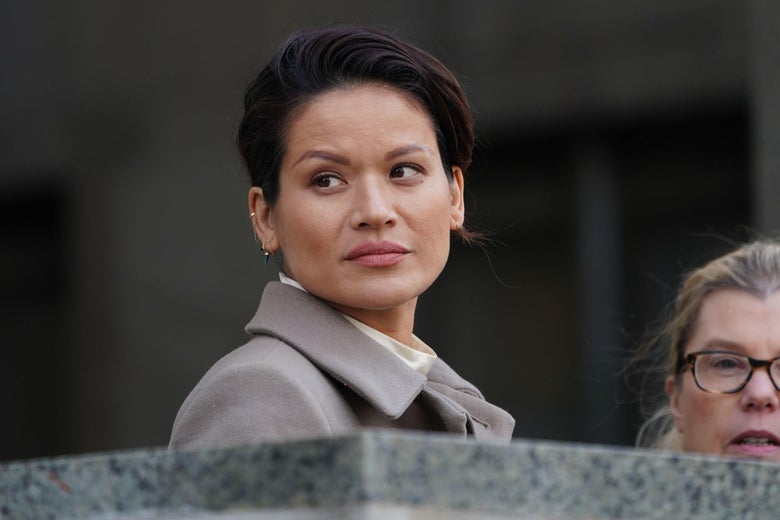
Tarale Wulff, who testified that Harvey Weinstein raped her in 2005, speaks outside the Manhattan Criminal Court on March 11, 2020 on the occasion of Weinstein’s sentencing.
Bryan R. Smith/AFP/Getty Images
Harvey Weinstein was sentenced to 23 years in a New York state prison on Monday, bringing to a close a months-long trial that saw six women testify to the former movie producer’s pattern of sexual assaults.
This sentence is at the upper end of the range Weinstein was facing—the minimum was 5 years and the maximum was 29 years in prison for the two felony convictions a jury handed down on Feb. 24. If the jury had found him guilty of the two more severe predatory sexual assault charges prosecutors brought against him, he could have received a life sentence. Instead, jury members rejected those charges—and, implicitly, Annabella Sciorra’s rape accusation—leaving Justice James A. Burke with a lower range of sentencing options.
Even so, at 67, Weinstein is still probably looking at an effective life sentence. And the judge’s decision to disregard Weinstein’s continued plea, until moments before his sentencing, that he was “totally confused” by the accusations and believed every sex act was consensual, sends a strong message of support for survivors of sexual violence whose stories don’t fit an easily graspable narrative of victimization and trauma.
The defense spent its time in court, and in media appearances, arguing that Jessica Mann and Miriam Haley couldn’t possibly have felt they’d been sexually assaulted by Weinstein, since they had subsequent sexual contact with him and sent friendly-sounding messages to him years later. Along with prosecutors, Mann and Haley attempted to explain that people can respond to sexual assault in any number of ways, including making efforts to normalize the relationship and protect themselves from having to acknowledge that they’ve been victimized. They refused to allow that solicitous emails or bouts of consensual sex could negate or disprove instances of rape. The jury accepted that uncommonly nuanced narrative of trauma, and it seems the judge did, too.
Most of the allegations against Weinstein will never be assessed by judges or juries due to expired statutes of limitation, the many nondisclosure agreements Weinstein had his victims sign, and prosecutors’ reluctance to bring difficult-to-prove sexual assault cases into courts of law. As a result, this case came to represent the dozens of stories of Weinstein’s sexual misconduct that have been made public over the past few years. Jury members were instructed to limit their deliberations to the few accusations that were delivered in court, but judges have a lot more leeway when they decide on a sentence. They can take into account previous criminal behavior, the impact on victims, and any mitigating factors in the defendant’s life. Burke wasn’t able to make judgments on the many other rapes women have accused Weinstein of committing, but, at the very least, he could evaluate the stories of the three supporting witnesses prosecutors brought in to support the main victims’ testimonies. Each accused Weinstein of additional sex crimes. And when prosecutors asked Burke for a long sentence for Weinstein, they mentioned the many other allegations that had never made it to court, stretching back to a woman who said he raped her on a work trip in 1978. Weinstein’s full history of sexual misconduct, adjudicated and alleged, surely played into Burke’s decision to give him a hefty sentence for his crimes.
There are sounds of rejoicing at this long overdue comeuppance for one of the most famous, powerful, and prolific sexual abusers in known modern history. And yet, there is a plaintive note alongside it: A jury couldn’t even convict Harvey Weinstein—Harvey Weinstein!—of all the charges brought against him. A judge couldn’t give Harvey Weinstein—Harvey Weinstein!—the maximum sentence. Dozens of women have accused him of sexual misconduct; six testified, in this case, to his brutal sexual assaults. It still wasn’t enough to convince judge or jury that he’d earned the harshest penalty. Six women braved an unrelenting media spotlight, a team of ruthless well-paid defense attorneys, and the man who’d sexually assaulted them to seek accountability for all the other women he’s allegedly abused. In the end, their combined stories were enough to outweigh Weinstein’s denials. But in the wake of a case that was always going to be read as representative of what the broader #MeToo movement has earned, there’s still a twinge of loss.
Readers like you make our work possible. Help us continue to provide the reporting, commentary and criticism you won’t find anywhere else.
Join Slate Plusfrom Slate Magazine https://ift.tt/2xxQxKZ
via IFTTT
沒有留言:
張貼留言